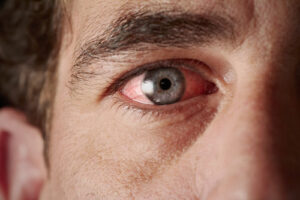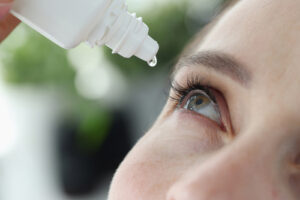Posted by: Focal Point Vision in Blog


Throughout your journey through life, you may come across a myriad of challenges concerning your eyes. These diverse issues range from minor inconveniences to potentially disabling conditions.
Dry eye syndrome is very common. It initially presents itself as a bothersome inconvenience, but as time passes, it can escalate into a more severe concern.
Under good conditions, dry eye syndrome proves to be distracting or mildly painful. However, neglecting proper treatment could lead to discomfort and even jeopardize your precious vision.
Keep reading to learn more about dry eye syndrome, including determining whether or not it may be preventing you from living your best life!
What is Dry Eye Syndrome?
Dry eye syndrome results from a dysfunction in the tear production process of your eyes, affecting either the quantity or quality of tears. In severe cases, both aspects may be compromised.

Insufficient tear production can significantly impact your eyes as tears play a crucial role in hydrating the eyes and providing essential nutrients. Additionally, tears form a protective barrier, shielding the eyes from potential infections or harmful particles.
Typically, tear production naturally decreases with age. Tears consist of three primary components: water, mucus, and an oily lipid layer.
Water carries essential nutrients and hydration to the eyes, while mucus helps the water adhere to the eye’s surface. The oily lipid layer coats the tear, preventing rapid evaporation of the water.
When tear quality is compromised, the problem often lies in the amount of oil present in the tear. This oil is secreted by glands in the eyelids.
If these glands become blocked or inflamed, the tear lacks the necessary protection, causing the water to evaporate before fully hydrating the eye.
This can lead to discomfort and vision issues.
Is Dry Eye Affecting Your Daily Life?
Chronic dry eye causes many different symptoms, ranging from mild to severe. These symptoms include:

- Redness in the eyes
- Itchiness
- Sensitivity to light
- Stringy mucus discharge around the eyes
- Difficulty driving at night
- Blurry vision
- Eye fatigue
Dry eye’s impact extends beyond mere physical symptoms, taking a toll on your mental and emotional well-being as well. If left unaddressed, dry eyes can easily become susceptible to infections.
Particles like dirt, sand, or dust that enter the eyes pose a risk of damaging the cornea, leading to corneal abrasions and potential scar tissue formation. Tears play a vital role in sustaining a regular and healthy life, emphasizing their crucial significance.
How Can Dry Eye Be Prevented?
Preventing dry eye syndrome involves several proactive measures to safeguard and maintain the well-being of your eyes. Although it may not be feasible to adopt all these tips immediately, practicing eye safety whenever possible is essential.
To begin, ensure you stay well-hydrated, as your body relies on water for tear production. A nutritious diet, abundant in vitamins and minerals, is crucial, especially with omega-3 fatty acids from fish and nuts and vitamin A from carrots, broccoli, or liver, to support tear quality.
For those with allergies, maintain a clean living space, free from dust, pollen, and pet dander. Use regular wet cloth wipe-downs to prevent allergens from becoming airborne and causing irritation.
Enhance your home’s air quality with a humidifier, which helps maintain adequate moisture levels, reducing eye strain from environmental factors. Coupling the humidifier with an air purifier further optimizes the atmosphere inside your home.
If you’re a smoker, consider quitting or reducing smoking, as tobacco smoke leads to vision issues and exacerbates dry eye symptoms due to eye irritation. Shield your eyes from sunlight by wearing wide-brimmed hats and 100% UV-protected sunglasses.
Combat screen-induced dryness by taking frequent breaks. Remember to blink regularly when engaged with screens, or set reminders to look away from the screen every twenty minutes for at least twenty seconds.
Incorporating these steps into your routine can protect your eyes and help prevent dry eye syndrome.
What Is Dry Eye Treatment Like?
Dry eye treatment varies depending on the underlying cause and severity of the condition. Treatment aims to address the root cause of dry eye and alleviate symptoms to improve eye comfort and overall well-being.
Here are some common aspects of dry eye treatment:
Artificial Tears
The most basic and widely used treatment involves over-the-counter artificial tears or lubricating eye drops. These provide temporary relief by supplementing the natural tear film, moisturizing the eyes, and reducing dryness and irritation.
Prescription Medications
If the underlying cause of dry eye is related to inflammation, your eye care professional may prescribe anti-inflammatory eye drops or ointments to manage the condition.
Punctal Plugs
For individuals whose tears drain too quickly from the eyes, punctal plugs may be inserted into the tear ducts. These tiny plugs help retain tears on the eye’s surface for a longer time, enhancing lubrication.

Warm Compresses
Warm compresses applied to the eyes can help improve the function of the oil-producing glands in the eyelids, aiding in the secretion of essential oils that contribute to tear stability.
Advanced Therapies
In more severe cases or when conventional treatments are ineffective, your eye doctor may recommend in-office treatments to help improve your symptoms.
Prescription Medications
In cases of severe dry eye caused by autoimmune conditions, your eye doctor may prescribe medications to control the immune response and reduce inflammation.
It’s crucial to consult with an eye doctor at Focal Point Vision to receive a comprehensive evaluation of your specific dry eye condition and develop a personalized treatment plan that addresses your unique needs. Regular follow-up appointments may be necessary to monitor progress and adjust the treatment.
Remember that early intervention and consistent management are essential for effectively managing dry eye and maintaining eye health.
Are you experiencing symptoms of dry eye syndrome? Schedule an appointment at Focal Point Vision in San Antonio, TX, today!
